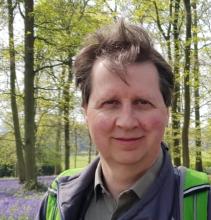Professional summary
Prof. Johnson obtained a PhD in Soil Science at Reading University in 1988. Since 1992 he has been employed as a research scientist at the UK Centre for Ecology and Hydrology. His work has focused on the impact of chemical contaminants on the natural environment. These environments have included soils, rivers, sewage and groundwater. The contaminants studied include pesticides, endocrine disrupting compounds, pharmaceuticals, personal care products, persistent organic pollutants, metals, nanoparticles and microplastics. To better understand these impacts he has worked with hydrologists, modellers, ecotoxicologists, ecologists and statisticians at UKCEH and in academia. Much recent research has been examining the fate and behaviour of microplastics in tap water, wastewater and rivers. His NERC-funded ChemPop project looked at chemical impacts on wildlife populations in water, land and marine environments.
He has published over 140 peer reviewed papers. This research has been supported by funding from NERC, Defra, Environment Agency, UK Water Industry and the EU. He remains a visiting Professor at Brunel University and worked as a visiting Professor in Kyoto University, Japan in 2008. He was a member of the Defra Hazardous Substances Advisory Committee from 2014 to 2022, the Science Advisory Group for the Environment Agency since 2018 and the European SCHEER working group on chemicals since 2021. Since 2022 he has been a member of the UKWIR Committee on Substances of Emerging Concern to the Water Industry. On 16th May 2022 he was named as one of the top 100 UK influential environmental professionals who had made the greatest impact by the ENDS Report magazine.
Qu Yueming et al. , (2023), Significant improvement in freshwater invertebrate biodiversity in all types of English rivers over the past 30 years. Science of the Total Environment, 905
